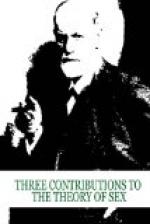Degeneration.—This term degeneration is open to the objections which may be urged against the promiscuous use of this word in general. It has in fact become customary to designate all morbid manifestations not of traumatic or infectious origin as degenerative. Indeed, Magnan’s classification of degenerates makes it possible that the highest general configuration of nervous accomplishment need not exclude the application of the concept of degeneration. Under the circumstances, it is a question what use and what new content the judgment of “degeneration” still possesses. It would seem more appropriate not to speak of degeneration: (1) Where there are not many marked deviations from the normal; (2) where the capacity for working and living do not in general appear markedly impaired.[6]
That the inverted are not degenerates in this qualified sense can be seen from the following facts:
1. The inversion is found among persons who otherwise show no marked deviation from the normal.
2. It is found also among persons whose capabilities are not disturbed, who on the contrary are distinguished by especially high intellectual development and ethical culture.[7]
3. If one disregards the patients of one’s own practice and strives to comprehend a wider field of experience, he will in two directions encounter facts which will prevent him from assuming inversions as a degenerative sign.
(a) It must be considered that inversion was a frequent manifestation among the ancient nations at the height of their culture. It was an institution endowed with important functions. (b) It is found to be unusually prevalent among savages and primitive races, whereas the term degeneration is generally limited to higher civilization (I. Bloch). Even among the most civilized nations of Europe, climate and race have a most powerful influence on the distribution of, and attitude toward, inversion.[8]
Innateness.—Only for the first and most extreme class of inverts, as can be imagined, has innateness been claimed, and this from their own assurance that at no time in their life has their sexual impulse followed a different course. The fact of the existence of two other classes, especially of the third, is difficult to reconcile with the assumption of its being congenital. Hence, the propensity of those holding this view to separate the group of absolute inverts from the others results in the abandonment of the general conception of inversion. Accordingly in a number of cases the inversion would be of a congenital character, while in others it might originate from other causes.
In contradistinction to this conception is that which assumes inversion to be an acquired character of the sexual impulse. It is based on the following facts. (1) In many inverts (even absolute ones) an early affective sexual impression can be demonstrated, as a result of which the homosexual inclination developed. (2) In many others outer influences of a promoting and inhibiting nature can be demonstrated, which in earlier or later life led to a fixation of the inversion—among which are exclusive relations with the same sex, companionship in war, detention in prison, dangers of hetero-sexual intercourse, celibacy, sexual weakness, etc. (3) Hypnotic suggestion may remove the inversion, which would be surprising in that of a congenital character.




